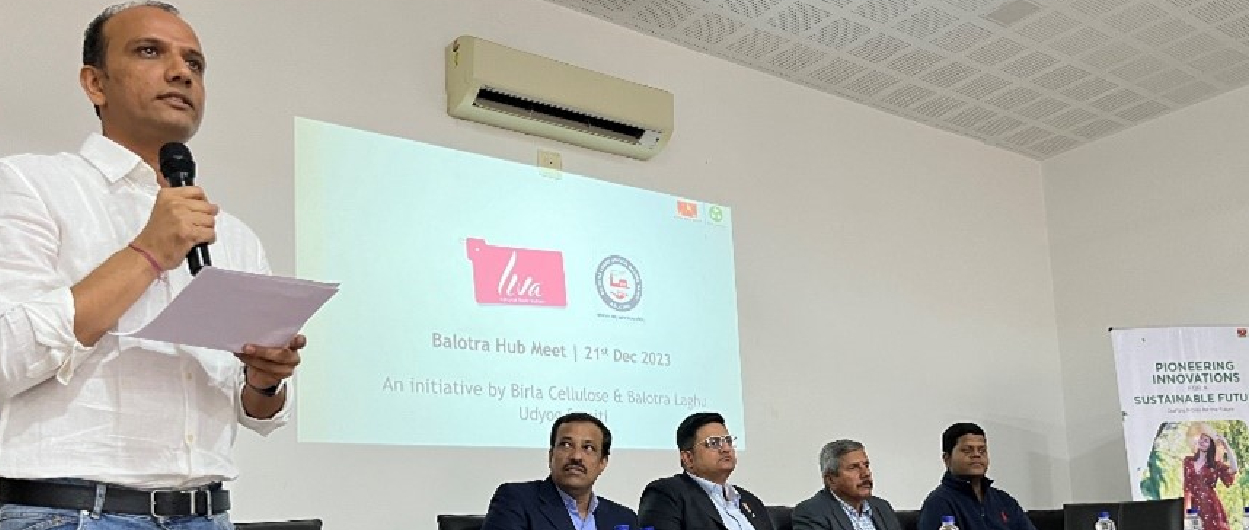Textile Development in Balotra: Birla Cellulose’s Initiative for Sustainable Growth
July 09, 2024In an effort to bolster the textile industry's growth and development in Rajasthan, the Woven Category Team of Grasim Industries Ltd, supported by the Balotra Laghu Udyog Mandal Samiti (BLUMS) and the Indian Institute of Handloom Technology (IIHT) in Jodhpur, organized a significant Hub Meet in Balotra, Jodhpur, in Q4 2024. The primary objective of this initiative was to create awareness about Birla Cellulose products and services and to enhance the technical knowledge among processors for hub and cluster development.
Balotra, located in the Barmer district, has become an industrial hub, especially known for its small-scale textile dyeing and printing units. The industrial area established by RIICO has been pivotal in this growth. Balotra is renowned for producing dyed rubia, cambric, lining cloth, and poplin, which are essential materials widely used across India. The town supplies thousands of shades of dyed fabrics and has earned recognition among merchant exporters for its expertise in producing printed fabrics and dress materials. Remarkably, Balotra caters to about 90% of the petticoat cloth market in India, making it a key player in the textile industry.
As a leader in manmade cellulose fibre (MMCF), Birla Cellulose is dedicated to setting trends in ecological and sustainable products. Their aim is to enable the entire textile value chain to follow sustainable practices and thrive economically. However, the technological challenges in Balotra's hub present significant barriers to achieving this goal.
Balotra's textile processing units face several technological challenges. The use of primitive technology and a lack of scientific knowledge regarding dyes, chemicals, and process parameters impede improvements in quality, productivity, and economic viability. For instance, mercerizing is done in jiggers, which not only wastes caustic soda and increases pollution but also provides no real mercerizing effect, amounting to mere causticisation. Caustic impregnation for 24 hours for scouring purposes can damage the fabric and does not result in proper scouring. Upgrading technology, exposure visits to quality clusters, and awareness creation for quality improvements and technological advancements are crucial to overcoming these challenges. For example, converting cold tables to hot ones enhance print sharpness and productivity due to quicker drying.
The Knowledge Sharing Hub Meet in Balotra aimed to explore new business opportunities with Birla Cellulose products through value chain processors from Balotra and Pali, Jodhpur. The event saw the participation of over 90 manufacturers and processors from Balotra and included a series of informative sessions and product displays.
The topics covered during the event included an introduction to Birla Cellulose along with an overview of products and services offered by them, a technical session on fabric processing led by Birla Cellulose's VCD Team, and opportunities with Birla Cellulose in fabric processing.

Key highlights of the event included support from the Balotra Laghu Udyog Mandal Samiti and IIHT (Jodhpur) as knowledge partners. Seasonal collections, including VSF-based dyed and printed fabrics, as well as garment collections, were displayed and well-received by attendees. Mr. Pushkar Kumar, VP Tex (Erode) was introduced as a value chain partner, showcasing a range of VSF-based fabric collections, which garnered positive responses. Prominent customers such as Roopchand Ji (Chairman, CETP), Gogars, Ummed Cotton Mill, Century Tex, Om Mahajan Export, BI Groups, Mor Mukut Fab, and Manali Synthetics were also in attendance.
The Hub Meet received an overwhelmingly positive response from the processing community of Balotra, particularly members of the Balotra Laghu Udyog Samiti Mandal. The event successfully created awareness among Balotra-based processors about the benefits of viscose-based products compared to competing fibers. It highlighted the significant progress made in establishing strong customer alliances, overcoming technical limitations, and fostering growth in the Balotra hub. These initiatives are instrumental in the success of Birla Cellulose products in this region, paving the way for future advancements and sustainable practices in the textile industry.











